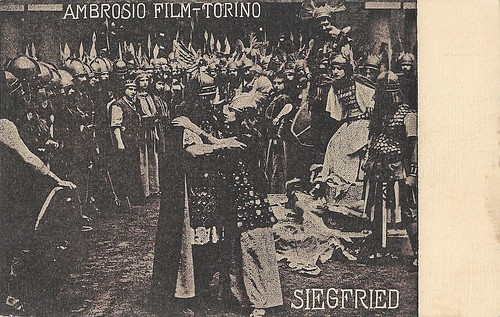
Italian postcard by Società Augusta Torino incise, Silvistrelli e Cappelletto Torino imprese. Photo: Ambrosio Film, Torino. Publicity still for Siegfried aka Sigfrido (Mario Caserini, 1912). Siegfried gloriously returns to the castle of his father, where he is celebrated during a banquet in his honour.

Italian postcard by Società Augusta Torino incise, Silvistrelli e Cappelletto Torino imprese. Photo: Ambrosio Film, Torino. Publicity still for Siegfried aka Sigfrido (Mario Caserini, 1912). Siegfried hears about the fair Kriemhild, a Burgundian princess and the sister of King Gunther.

Italian postcard by Società Augusta Torino incise, Silvistrelli e Cappelletto Torino imprese. Photo: Ambrosio Film, Torino. Publicity still for Siegfried aka Sigfrido (Mario Caserini, 1912). Siegfried's father gives his son a mighty sword and sends him to King Gunther's court with an army of soldiers. Yet, later on, Siegfried liberates the gnome Mime, who pays back by making Siegfried a magic sword. With this sword, Siegfried will extinguish the ring of fire around Brunhild, held in captivity.

Italian postcard by Società Augusta Torino incise, Silvistrelli e Cappelletto Torino imprese. Photo: Ambrosio Film, Torino. Publicity still for Siegfried aka Sigfrido (Mario Caserini, 1912). King Gunther tells Siegfried he may marry Kriemhild if he manages to conquer Queen Brunhild and bring her to Gunther as Gunther's wife.

Italian postcard by Società Augusta Torino incise, Silvistrelli e Cappelletto Torino imprese. Photo: Ambrosio Film, Torino. Publicity still for Siegfried aka Sigfrido (Mario Caserini, 1912). As thanks for delivering Brunhild to king Gunther, Siegfried may marry Kriemhild. Brunhild is furious as she is in love with Siegfried.
A prologue to the Richard Wagner centenary in 1913
The film Sigrido/Siegfried was released in Italy in October 1912. Both Siegfried and another Ambrosio production Parsifal (Mario Caserini, 1912) were made in 1912 as a prologue to the Richard Wagner centenary in 1913.
In their volume 'Il cinema muto italiano 1912, part 2', Aldo Bernardini and Vittorio Martinelli indicate Dario Silvestri as playing Siegfried. However, the actor looks very similar to the actor playing the title role in Parsifal by Ambrosio, who Bernardini and Marinelli identify as Vitale De Stefano.
Siegfried's slaying of the dragon, which was so prominent in Fritz Lang's film Die Nibelungen I. Siegfried (1924), has a small part in the original saga and is absent in the Ambrosio film, according to the brochure of the film.
Arrigo Frusta wrote the script, while Angelo Scalenghe did the cinematography.
A print of the film exists within the Komiya Collection in Japan and was screened at the 2018 edition of the Cinema Ritrovato festival in Bologna.

Italian postcard by Società Augusta Torino incise, Silvistrelli e Cappelletto Torino imprese. Photo: Ambrosio Film, Torino. Publicity still for Siegfried aka Sigfrido (Mario Caserini, 1912). Siegfried returns a hero. Brunhild discovers she is not to marry Siegfried but Gunther, while Kriemhild marries Siegfried. [This moment on the card does not occur in the film but symbolizes the rivalry.]

Italian postcard by Società Augusta Torino incise, Silvistrelli e Cappelletto Torino imprese. Photo: Ambrosio Film, Torino. Publicity still for Siegfried aka Sigfrido (Mario Caserini, Ambrosio 1912). Brunhild is jealous of Siegfried and Kriemhild and plots his assassination with the help of Hagen, who loves Brunhild.

Italian postcard by Società Augusta Torino incise, Silvistrelli e Cappelletto Torino imprese. Photo: Ambrosio Film, Torino. Publicity still for Siegfried aka Sigfrido (Mario Caserini, 1912). A maid overhears the conspiracy against Siegfried by Brunhild (Antonietta Calderari) and Hagen (Serafino Vité), but Hagen threatens to kill her if she betrays them.

Italian postcard by Società Augusta Torino incise, Silvistrelli e Cappelletto Torino imprese. Photo: Ambrosio Film, Torino. Publicity still for Siegfried aka Sigfrido (Mario Caserini, 1912). Siegfried is cowardly killed by Hagen. After Siegfried's death, Kriemhild will avenge herself by raising an enormous army against the conspirators, who have hidden in a castle of the Burgundians. Kriemhild's army invades the castle, sets it on fire, and defeats the Burgundians. According to the brochure of the film Kriemhild kills Brunhild by her own hand. The existing print lacks the last meters, so we don't see the ending of Brunhild and Hagen.
Sources: Aldo Bernardini and Vittorio Martinelli (Il cinema muto italiano 1912), the film's Italian brochure and IMDb. For the Nibelungenlied, see Wikipedia. For the screening of the Komiya Collection print in Bologna, see the text by Hiroshi Komatsu in the catalogue. With thanks to Hiroshi Komatsu.
No comments:
Post a Comment